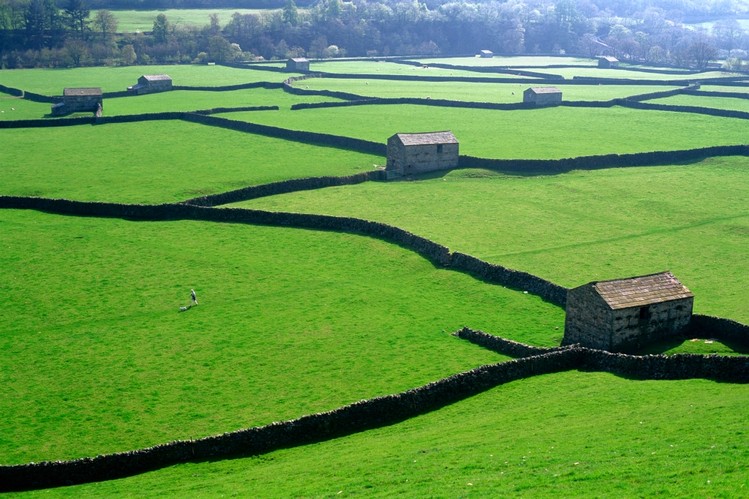The law locks up the man or woman
who steals the goose from off the common
but leaves the greater villain loose
who steals the common from off the goose.
The law locks up the man or woman
Who steals the goose from off the common
And geese will still a common lack
Till they go and steal it back.
Anonymous
The English enclosure movement, which started in the fifteenth century and went on until the nineteenth, was a process of fencing off common land and turning it into private property. It is a story of consolidation of power by landowners with the help of the state, and was supported by political philosophers such as Hobbes and Locke. (Locke held that land became private property by the admixture of labor, which was the unquestionable property of the laborer -- in this case the capitalist.) Critics of that transformation have called it a state-supported "revolution of the rich against the poor" and "a plain enough case of class robbery." (eg. Michael Polanyi, The Great Transformation, E.P. Thompson, The Making of the English Working Class.) Following Marx, these historians see the process of enclosure as the forcible expropriation of the agricultural population, and the transformation of their means of labour into capital. (see Karl Marx, Capital, volume 1, chapt. 27).
The social group that was most disclocated by enclosure was the yeomanry, a class of independent peasants who cultivated small plots of lands (similar to allotment gardens) and pastured their livestock in commons. .The "open field system", the prevalent agricultural system that had originated in the Middle Ages, combined the cultivation of assigned strips of land in large fields, crop rotation, and access to the commons. But the yeoman's claim to cultivate the land was based on "ancient rights an priveleges", not on ownership. With the enclosure of common lands, those claims were rejected by landowners and the traditional uses came to be defined as "theft".
Economic historians sympathetic to the rise of capitalism have seen the enclosure movement as enabling the transformation of agricultural practice, resulting in increased production for a growing population, the expansion of cities, (and increased rents for the landowners). According to this latter interpretation, the new techniques and investments made possible by privatization offset the ecological instability of the open field system, and put resources to efficient use rather than leading to the inexorable exhaustion of the soil from overuse and underinvestment. (although some recent scholarship has been more sceptical of the claims of increased productivity). Some historians have also noted that the enclosure movement did not so much eliminate crowding of pastures as reduce transaction costs, facilitating movement from lower-valued to higher-valued uses of land, since it was not necessary to get the agreement of all users of the pasture.
Pessimism about the long-term consequences of common resources found a powerful expression in Garrett Hardin's classic essay of 1968, "The Tragedy of the Commons". Hardin's essay is a powerful argument against stewardship without ownership. In this dramatic narrative, individual self-interest goes against the common interest, because when a resource is freely available to all, each individual has an incentive to take more without limit. (The essay was written during a time of anxiety about the "population bomb".) But every resource has its limits. According to this argument, the commons cannot defend itself from overuse without a brake provided by property restrictions or state regulation. Hence, to claim a free "right" to environmental resources, such as the fish in the ocean leads directly to over-fishing in the absence of constraints (licensing, quotas, preservation measures etc.), and it is usually assumed that these constraints must come from the "outside" rather than from the community of users themselves.
Is the inevitability of degradation of the commons an over-dramatization or a real insight into human character as fated to selfishness and self-destruction? Or does the commons provide a model for a relation to the environment as a shared good that no one should be denied?
The law locks up the man or woman
who steals the goose from off the common
and geese will still a common lack
until they go and steal it back.
Today’s concept of the commons
recognizes the interdependence of all human rights and acknowledges that adequate food, housing, health care, education, social security, and fair working conditions are more than matters of government policy—they are things to which all human beings are unconditionally entitled.
The laws and policies In North American societies illustrate an ongoing conflict between considering these as public goods and the forces of enclosure through privatization. The former approach limits the commodification of housing, for instance, while the latter promotes a system of valuation (and subsidies to homeowners) that promotes insecurity.
The lack of desirable public housing makes home ownership a way to compensate for the absence of a robust and trustworthy welfare state, particularly due to the lack adequate public pensions in old age, making houses places to live and investments – often put up for sale to pay medical bills (see Astra Taylor, the Age of Insecurity.)

